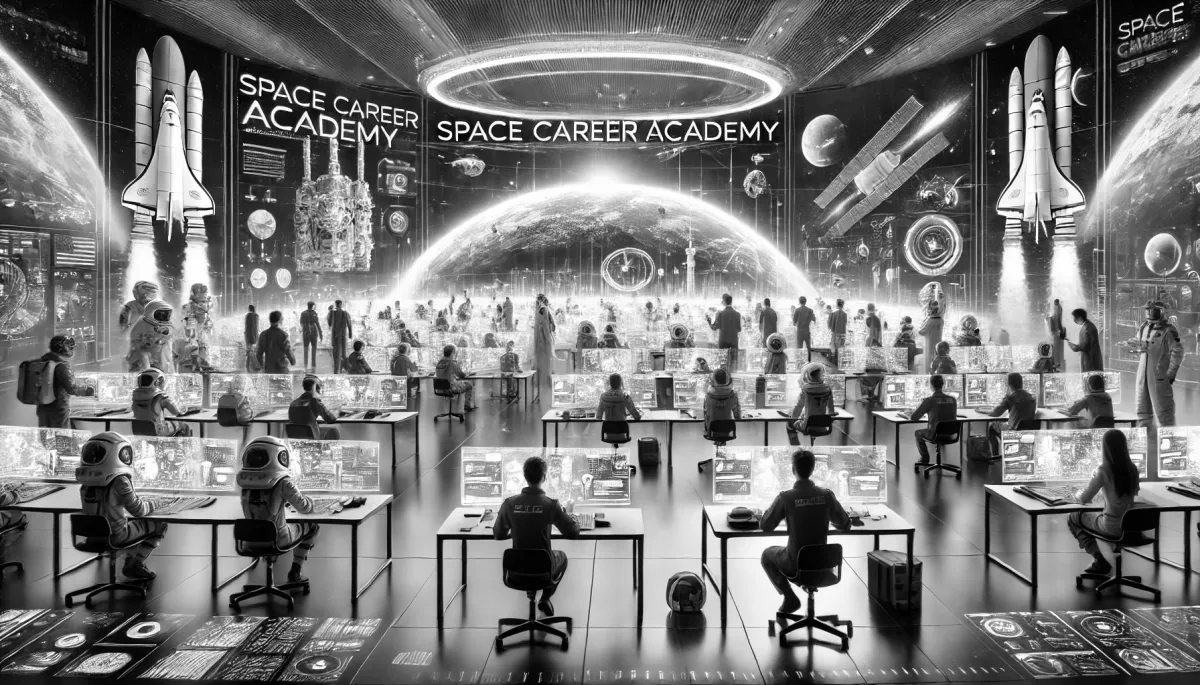Space and Tech Remote Cohorts
The Future-Proof STEAM Experience
The future of humanity lies beyond Earth, and the next generation of space pioneers is being trained today. Be part of this historic journey

Ready to Start Your Journey?
Choose Launchpad for career seekers or the Incubator for aspiring entrepreneurs and startups. Both offer mentorship, industry access, and Space Therapy for balance and growth.
Choose Your Pathway


Launchpad
(B2C)
This is the pathway focused on individual career seekers (students, professionals) looking for job placements, internships, or career advancement in the space industry. It's more personal.

Incubator
(B2B)
This pathway focuses on entrepreneurs, startups, and businesses looking for support, mentorship, and resources to scale their ventures in the space industry. This is a business-focused pathway

GLOBAL BOOTCAMPS

1-1 Space Therapy
At SCA, we ensure that our participants find balance in their careers and ventures, fostering personal well-being alongside professional growth.
Whether you're looking to accelerate your career or build the next big space venture, SCA’s comprehensive programs equip you with the tools and support to reach new heights, both professionally and personally.
FAQ'S
Launchpad (B2C)
1. What is the Launchpad Pathway?
The Launchpad Pathway is designed to help aspiring professionals kickstart their careers in the space industry. It offers training, mentorship, networking opportunities, and access to internships and job placements with leading space organizations.
2. Who is eligible for the Launchpad Pathway?
The program is open to individuals who are passionate about pursuing a career in space, including students, recent graduates, or those transitioning into the space sector. No prior experience in space is required, but a strong interest in science, technology, engineering, or related fields is recommended.
3. How long does the program last?
The Launchpad Pathway typically lasts 3-6 months, depending on the specific program schedule and individual goals.
4. Will I be guaranteed an internship or job placement?
While we cannot guarantee a placement, the program provides strong support in securing internships and job opportunities. We have partnerships with top space companies and work closely with you to improve your chances of success.
5. What type of support will I receive during the program?
Participants receive personalized mentorship, access to professional development workshops, networking events, and assistance with job placements. Additionally, space therapy helps ensure you maintain balance and resilience throughout the program.
6. How do I apply?
You can apply through our website by filling out the application form. You’ll need to submit your resume and a brief statement of interest explaining why you want to join the Launchpad Pathway.
7. Is there a cost to participate?
There may be a program fee depending on the specific cohort. We also offer scholarships and payment plans for eligible candidates.
Incubator (B2B)
1. What is the Incubator Pathway?
The Incubator Pathway is designed to help space startups accelerate their growth. It provides expert mentorship, funding opportunities, business development resources, and access to a global network of investors and partners to help scale your space venture.
2. Who is eligible for the Incubator Pathway?
The program is for early-stage startups in the space sector, including companies with an idea or product ready to grow. We welcome founders, co-founders, and entrepreneurs looking to scale their business.
3. How long does the program last?
The Incubator Pathway typically lasts 6-12 months, depending on the needs of your startup and the stage of your business.
4. Will I receive funding or investment through the program?
While the program itself doesn’t guarantee funding, it provides opportunities to connect with investors and secure funding through pitch events,
mentorship, and networking with industry partners.
5. What kind of mentorship and support will I receive?
Startups will be paired with experienced mentors who offer guidance in areas such as business strategy, product development, fundraising, and market entry. You’ll also have access to tailored workshops and industry resources.
6. How do I apply?
Applications can be submitted through our website, where you’ll provide details about your startup, its current stage, and the specific support you need.
7. Is there a cost to participate?
There may be a participation fee or equity share, depending on the type of support and resources your startup receives. We offer flexible options based on your business’s needs.
Space Therapy
1. What is Space Therapy?
Space Therapy is a wellness program designed to help participants maintain mental clarity, resilience, and balance as they navigate their careers or entrepreneurial journeys in the space industry. It integrates personalized well-being strategies to ensure participants stay grounded and perform at their best.
2. Who can participate in Space Therapy?
Space Therapy is available to all participants in the Launchpad and Incubator pathways, as well as any individual seeking support for managing stress, maintaining focus, or improving work-life balance while working in or around the space industry.
3. What kind of support does Space Therapy provide?
Space Therapy offers one-on-one coaching, mindfulness techniques, stress management strategies, and emotional resilience tools. It also includes group workshops and access to resources that help you maintain a healthy, balanced mindset.
4. How does Space Therapy work?
Participants engage in virtual or in-person sessions with certified wellness coaches, where they receive tailored advice and tools for managing the challenges of their professional and personal lives. Regular check-ins and workshops are also available to ensure ongoing support.
5. Is Space Therapy included in the program?
Yes, Space Therapy is an integral part of both the Launchpad and Incubator pathways. Participants in both pathways receive access to Space Therapy services as part of their journey.
6. How long do the Space Therapy sessions last?
Sessions vary in length depending on individual needs. Typically, sessions last between 30 to 60 minutes, with ongoing support available through workshops and group sessions.
7. Will Space Therapy help with work-life balance?
Yes! One of the key benefits of Space Therapy is its focus on helping participants achieve a better work-life balance, reduce burnout, and increase overall well-being to support their professional success.
8. How do I access Space Therapy?
You can schedule a session with a Space Therapy coach through the Space Career Academy platform. Information on upcoming workshops and group sessions will be shared with you during your program.
9. Is there an additional cost for Space Therapy?
Space Therapy is included in the cost of participation in the Launchpad and Incubator pathways. There are no additional fees to access the therapy services provided as part of these pathways.
10. How do I get started with Space Therapy?
Once you’re enrolled in the Launchpad or Incubator pathway, you’ll receive instructions on how to book your first Space Therapy session and start using the resources available to you.

The Space Career Academy is an incubator and launchpad for aerospace careers.
2025 by Space Career Academy
Stay in the Loop.

Facebook
X
LinkedIn
Instagram